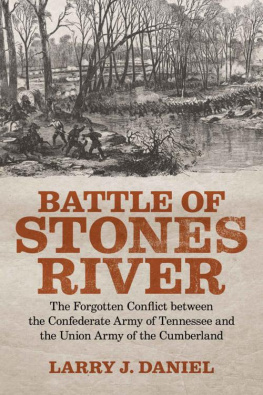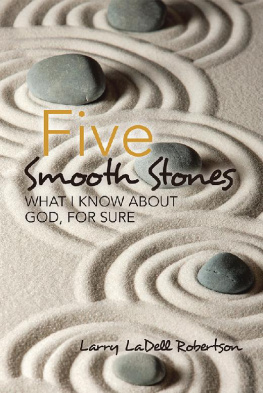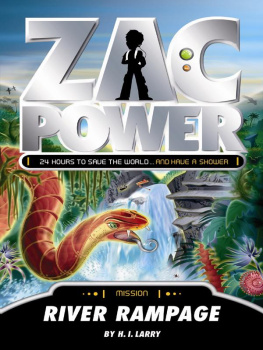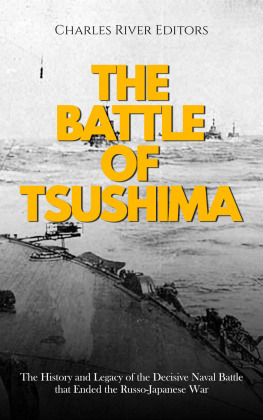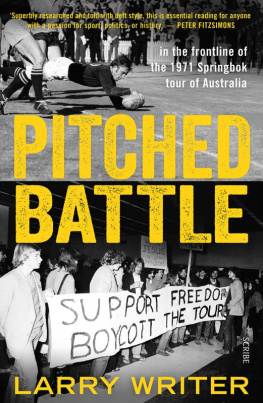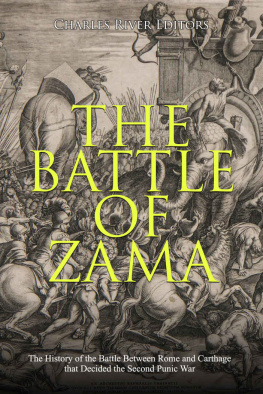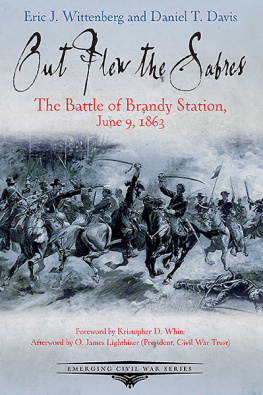Larry J. Daniel - Battle of Stones River
Here you can read online Larry J. Daniel - Battle of Stones River full text of the book (entire story) in english for free. Download pdf and epub, get meaning, cover and reviews about this ebook. year: 2012, publisher: LSU Press, genre: Non-fiction. Description of the work, (preface) as well as reviews are available. Best literature library LitArk.com created for fans of good reading and offers a wide selection of genres:
Romance novel
Science fiction
Adventure
Detective
Science
History
Home and family
Prose
Art
Politics
Computer
Non-fiction
Religion
Business
Children
Humor
Choose a favorite category and find really read worthwhile books. Enjoy immersion in the world of imagination, feel the emotions of the characters or learn something new for yourself, make an fascinating discovery.
- Book:Battle of Stones River
- Author:
- Publisher:LSU Press
- Genre:
- Year:2012
- Rating:3 / 5
- Favourites:Add to favourites
- Your mark:
- 60
- 1
- 2
- 3
- 4
- 5
Battle of Stones River: summary, description and annotation
We offer to read an annotation, description, summary or preface (depends on what the author of the book "Battle of Stones River" wrote himself). If you haven't found the necessary information about the book — write in the comments, we will try to find it.
Battle of Stones River — read online for free the complete book (whole text) full work
Below is the text of the book, divided by pages. System saving the place of the last page read, allows you to conveniently read the book "Battle of Stones River" online for free, without having to search again every time where you left off. Put a bookmark, and you can go to the page where you finished reading at any time.
Font size:
Interval:
Bookmark:
BATTLE OF
STONES
RIVER
BATTLE OF
STONES
RIVER
The Forgotten Conflict between the Confederate Army of Tennessee and the Union Army of the Cumberland
Larry J. Daniel.

Published by Louisiana State University Press
www.lsupress.org
Copyright 2012 by Larry J. Daniel
All rights reserved. Except in the case of brief quotations used in articles or reviews, no part of this publication may be reproduced or transmitted in any format or by any means without written permission of Louisiana State University Press.
Louisiana Paperback Edition, 2020
Designer: Barbara Neely Bourgoyne
Typeface: MillerText
Cover image: Stones River National Battlefield Park, Murfreesboro, Tenn.
Some maps by Mary Lee Eggart. Several others are based upon adaptations of maps from No Better Place to Die: The Battle of Stones River. Copyright 1990 by the Board of Trustees of the University of Illinois. Used with permission by the University of Illinois Press.
Library of Congress Cataloging-in-Publication Data
Daniel, Larry J., 1947
Battle of Stones River : the forgotten conflict between the Confederate Army of Tennessee and the Union Army of the Cumberland / Larry J. Daniel.
pages cm
Includes bibliographical references and index.
ISBN 978-0-8071-7508-8 (paperback) ISBN 978-0-8071-4517-3 (pdf) ISBN 978-0-8071-4518-0 (epub) 1. Stones River, Battle of, Murfreesboro, Tenn., 18621863. I. Title.
E474.77.D36 2012
973.73dc23
2012000886
For my children, Lauren and Mark
CONTENTS
ILLUSTRATIONS
FIGURES
MAPS
PREFACE
In the late 1960s, Thomas L. Connelly took a critical look at the Civil War by examining the great expanse between the Appalachians and the Mississippi River known as the Western Theater. He would become the father of western revisionism. Over three decades a series of talented writers emerged who reshaped the national debatethat is, that the war was not North versus South but East versus West. It was in the last, they argued, that our national trauma was determined, by a series of Federal victories between 1861 and 1863. In recent years, the pendulum has begun to swing back to Virginia, with some historians insisting that the war was won in the Eastern Theater.
I wrote Battle of Stones River: The Forgotten Conflict between the Confederate Army of Tennessee and the Union Army of the Cumberland to give the battle its proper place in the war. The Battle of Fredericksburg in December 1862 gave stark evidence that the war in Virginia had ground to a stalemate. William T. Shermans expedition against Vicksburg, Mississippi, had likewise been checked. The fall 1862 U.S. congressional races had proven damaging to the prowar effort. The nation now focused its attention upon what Connelly referred to as the Heartland. The hope of both sides lay in Tennessee. Indeed, argues Donald Stoker, the Union effort in Mississippi proved a most glaring mistake, since the real war was in Tennessee, or as he termed it, a Confederate center of gravity.
Fought on the cusp of 186263, the Army of the Cumberland under Major General William S. Rosecrans and the Army of Tennessee under General Braxton Bragg clashed in a death struggle at Murfreesboro, Tennessee. Nearly 100,000 men fought in the three-day battle, and the two armies between them sustained 23,500 casualties. The battle would prove to be a draw, although strategically it was a Northern victory. Yet the mention of Stones River frequently brings puzzled expressions to those beyond the region. Perhaps the burgeoning growth of modern-day Murfreesboro, with a current population of 102,000, has unwittingly added to the battles obscurity, as developers have swallowed up land around the small national battlefield park. The ground over which the Confederates launched their assault, and which was so valiantly defended by the Federals, is now a huge mall and multi-story hotel.
Untapped primary material, including letters, diaries, and dozens of small-town newspapers, have added to previous works by James Lee McDonough and Peter Cozzens. First-hand accounts frequently proved to be more candid than official reports by officers who had careers to protect. These accounts also relate the grim reality of fighting a winter campaign in wretched, often bitter weather, in which thousands of troops on both sides forded waist-deep Stones River. Additionally, more detail is given to the role of politics, so that the reader can understand not only what happened but why it happened and why it mattered so much. Contemporary Northern accounts refer to the Battle of Stones River or Stone River. Because the National Park Service, the State of Tennessee, and most modern accounts refer to Stones River, I have accepted this usage. It should be noted that the Confederate press preferred the Battle of Murfreesboro. The town of La Vergne, Tennessee, was typically spelled Lavergne at the time. I have again chosen the modern spelling.
On the surface, it would appear that Stones River accomplished little more than an enormous body count. Bragg simply fell back twenty-six miles, and the war dragged wearily on. What was at stake, however, was how a protracted war, which clearly it had become by the winter of 186263, might come to conclusion. Could the South, as has been suggested, win by not losing? That is, could the Northern will to win be broken by an indefinitely extended war? This question was very much undecided in December 1862. For both sides to avoid the ramifications of such an issue, they had to accomplish the very thing they failed to accomplishdestruction of their opponents army. The bloody butchers list of casualties would bear mute testimony that it was not from a lack of trying. After the battle, a Rebel gave his evaluation: I am sick and tired of this war, and, I can see no prospects for having peace for a long time to come[.] I dont think it will ever be stopped by fighting, the Yankees cant whip us and we can never whip them.
With the war trending toward protraction, one side or the other had to gain the upper hand. A war of attrition for the South was not sustainablefacing the arithmetic as Stoker referred to it. A protracted war for the North meant a growing antiwar movement that could ultimately undermine the will to win. For both sides Stones River was therefore a must win. Bragg needed to counter the loss in Kentucky and permanently reclaim Middle Tennessee. As for Rosecrans, he had to undermine the growing antiwar movement, undercut a Tennessee argument for British intervention, and recoup Union morale after the stunning loss at the Battle of Fredericksburg.
ACKNOWLEDGMENTS
I am deeply indebted to the staff of the Stones River National Military Park, particularly Gib Backland, Jim Lewis, and John George. They offered their knowledge, assistance, patience, and encouraging support so that this project might be completed in time for the sesquicentennial of the battle in 2012. My appreciation is also extended to Lanny K. Smith. Although working on his own project on Stones River, he unselfishly shared all his material with me. Lanny, who probably knows more about the battle than any living person, enthusiastically received all my calls. He, along with Peter Cozzens, also gave his permission to base several of my maps upon those that appear in his two-volume work. I should also mention Dan Masters. His work on chronicling soldiers letters of the battle from dozens of small-town newspapers from Ohio and Illinois proved breathtaking. He readily shared his labor of love, thus adding the voices of scores of soldiers that otherwise would have been silent.
BATTLE OF
STONES
RIVER
Font size:
Interval:
Bookmark:
Similar books «Battle of Stones River»
Look at similar books to Battle of Stones River. We have selected literature similar in name and meaning in the hope of providing readers with more options to find new, interesting, not yet read works.
Discussion, reviews of the book Battle of Stones River and just readers' own opinions. Leave your comments, write what you think about the work, its meaning or the main characters. Specify what exactly you liked and what you didn't like, and why you think so.

